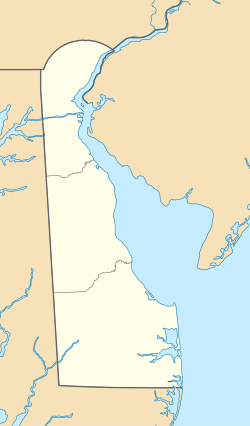Victorian Dover Historic District
Appearance
Victorian Dover Historic District | |
 Houses in the Victorian Dover Historic District, March 2010 | |
| Location | Roughly bounded by Silver Lake, St. Jones River, North and Queen Sts., Dover, Delaware |
|---|---|
| Coordinates | 39°09′51″N 75°31′35″W / 39.16417°N 75.52639°W |
| Area | 179 acres (72 ha) |
| Built by | Bradford, Rev. Thomas B. |
| Architectural style | Colonial Revival, Queen Anne, Gothic Revival |
| NRHP reference No. | 79000622[1] |
| Added to NRHP | July 16, 1979 |
Victorian Dover Historic District is a national historic district located at Dover, Kent County, Delaware. It encompasses 482 contributing buildings representative of the community's commercial, domestic and industrial development between the first quarter of the 19th century and the first quarter of the 20th century. Notable buildings include the Wesley United Methodist Church (c. 1850), Whatcoat United Methodist Church (1871-1872), Dover's Railroad Station (1860s, 1911), Capitol Theatre (1903-1904), and Priscilla Block (1896). Located in the district is the separately listed John Bullen House.[2]
It was added to the National Register of Historic Places in 1979.[1]
References
[edit]- ^ a b "National Register Information System". National Register of Historic Places. National Park Service. July 9, 2010.
- ^ Joan Norton Larrivee and Madeline Dunn Hite (August 1978). "National Register of Historic Places Inventory/Nomination: Victorian Dover Historic District". National Park Service. and Accompanying 50 photos
Categories:
- Culture of Dover, Delaware
- Queen Anne architecture in Delaware
- Colonial Revival architecture in Delaware
- Gothic Revival architecture in Delaware
- Historic districts in Kent County, Delaware
- Historic districts on the National Register of Historic Places in Delaware
- National Register of Historic Places in Dover, Delaware
- Delaware Registered Historic Place stubs




